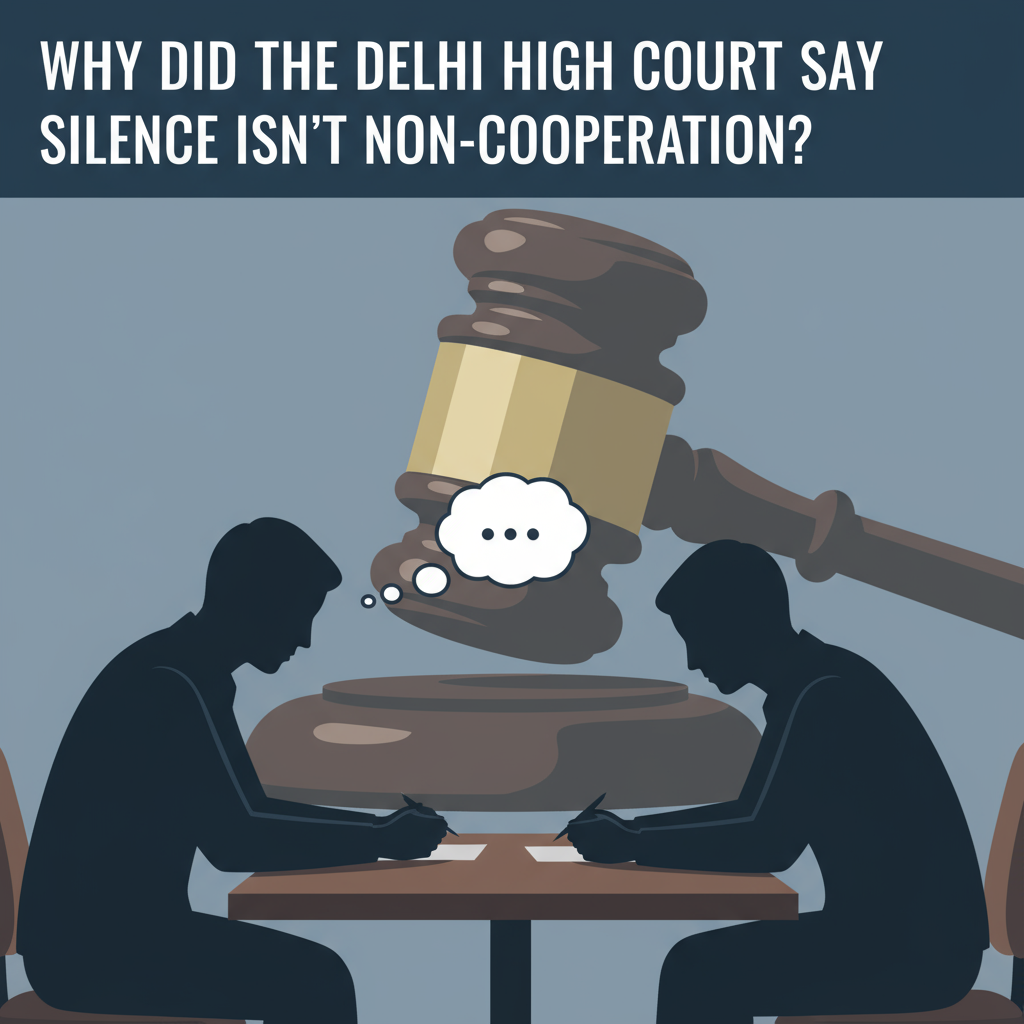Introduction: Accused Not Stating Self-Incriminatory Facts, Refusing to Confess Is Not Non-Cooperation Delhi High Court’s Guiding Principle Clarified
The Delhi High Court’s latest pronouncement carries understated wisdom a reminder that silence in the interrogation room isn’t the same as sabotage. Justice Arun Monga, in granting anticipatory bail to an accused in an extortion case, stressed the point: Accused Not Stating Self-Incriminatory Facts, Refusing to Confess Is Not Non-Cooperation, according to the Delhi High Court’s guiding principle.
Accused Not Stating Self-Incriminatory Facts, Refusing to Confess Is Not Non-Cooperation: Delhi High Court’s Guiding Principle in Real-World Context
The facts are more everyday than dramatic. A contractor, after hiring the accused to demolish and rebuild a house, alleged that extortion attempts followed. Accused Not Stating Self-Incriminatory Facts, Refusing to Confess Is Not Non-Cooperation, the Court ultimately determined, even as the prosecution argued for denial of bail. Sections 384, 385, 120B, and 34 IPC set the stage for this case, though the lower court had already turned down the bail plea once.
Bail and Judicial Reason: Accused Not Stating Self-Incriminatory Facts, Refusing to Confess Is Not Non-Cooperation Under Delhi High Court’s Guiding Principle
When the matter reached Justice Monga, it wasn’t secret evidence that swayed him, but a question of fairness. He cut through the usual noise around silence being treated as stonewalling. “Simply because the accused chose not to confess or supply self-incriminating details doesn’t mean they’re being uncooperative,” the judge said. This kind of silence, he explained, is best left for the trial to sort out, not for deciding bail. Evasive or not, an answer given is something to be judged in the courtroom, not during an application for anticipatory bail.
Ego, Evidence, and Law: Accused Not Stating Self-Incriminatory Facts, Refusing to Confess Is Not Non-Cooperation Delhi High Court’s Guiding Principle on Bail Opposition
The complainant pressed against bail, perhaps more for personal closure than clear evidence. Yet, Accused Not Stating Self-Incriminatory Facts, Refusing to Confess Is Not Non-Cooperation: Delhi High Court’s guiding principle meant the accused was not to be further detained when nothing remained to be recovered and procedures had been observed. The Court observed that simply having allegations is never enough to justify swift loss of freedom trials exist to test claims while the presumption of innocence remains intact.
Conclusion: Accused Not Stating Self-Incriminatory Facts, Refusing to Confess Is Not Non-Cooperation Delhi High Court’s Guiding Principle Reaffirmed
This decision draws a valuable boundary in law. Accused Not Stating Self-Incriminatory Facts, Refusing to Confess Is Not Non-Cooperation. The Delhi High Court clarified something important here: accused individuals aren’t on the hook to make the prosecution’s job any easier. Holding on to the right to stay silent isn’t just a legal technicality it’s what helps keep the scales balanced. It means people aren’t forced to talk themselves into trouble, while the courts still get to fairly decide who’s guilty and who’s not.
Author Information:
By Karthikeyan Ganesan, a law student from KKC College of Law, reporting on law and technology for Nyayasphere. Karthikeyan always likes to stay updated with current trends and important information regarding the law and cases across the country.

